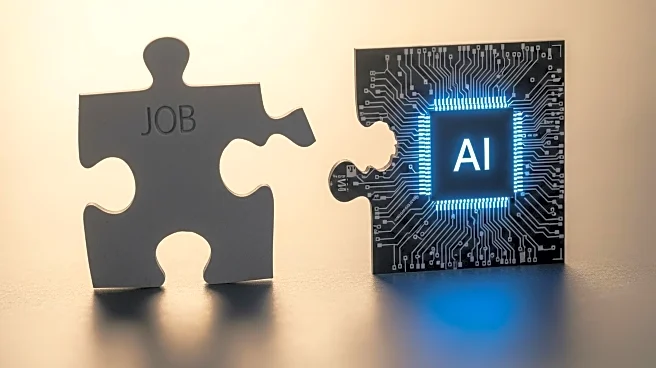What's Happening?
Recent college graduates from Generation Z are experiencing higher unemployment rates compared to the overall workforce, a trend that has been developing since 2015. Ed Yardeni, president and chief investment strategist at Yardeni Research, notes that the unemployment rate for recent graduates aged 22 to 27 has historically been lower than the overall workforce but began to exceed it during the pandemic. As of June, the unemployment rate for recent grads was 4.8%, compared to 4.0% for all workers. This shift is attributed to the increasing number of college-educated individuals in the workforce, leading to heightened competition for jobs among new entrants. Additionally, AI's role in reducing entry-level job opportunities is highlighted, although some argue that AI has also enabled more lower-level employees to make decisions independently, flattening organizational structures.
Why It's Important?
The growing unemployment rate among recent college graduates has significant implications for the U.S. economy and labor market. With 37.5% of Americans now holding a bachelor's degree or higher, the competition for jobs has intensified, potentially leading to underemployment and dissatisfaction among young workers. The impact of AI on entry-level positions further complicates the job market, as companies may hire fewer new workers. This situation is exacerbated by the student debt crisis, making young people more cautious about investing in higher education. The shift in perception regarding the value of a college degree could lead to increased interest in trade jobs, which are perceived as less vulnerable to AI disruptions.
What's Next?
As the Gen Z job crisis continues, there may be a growing trend towards alternative career paths, such as trade jobs, which offer stability and are less affected by AI. Companies might need to reassess their hiring practices and consider the long-term implications of relying heavily on AI. Additionally, policymakers may need to address the student debt crisis and explore ways to make higher education more accessible and valuable. The changing dynamics in the labor market could lead to broader discussions about the future of work and the role of technology in shaping employment opportunities.
Beyond the Headlines
The Gen Z job crisis highlights deeper societal shifts, including changing attitudes towards higher education and the evolving nature of work. As AI continues to influence job markets, ethical considerations regarding its deployment and impact on employment must be addressed. The crisis also underscores the need for educational institutions to adapt their curricula to better prepare students for the realities of the modern workforce. Long-term, this could lead to a reevaluation of the traditional pathways to career success and a greater emphasis on skills-based education.










